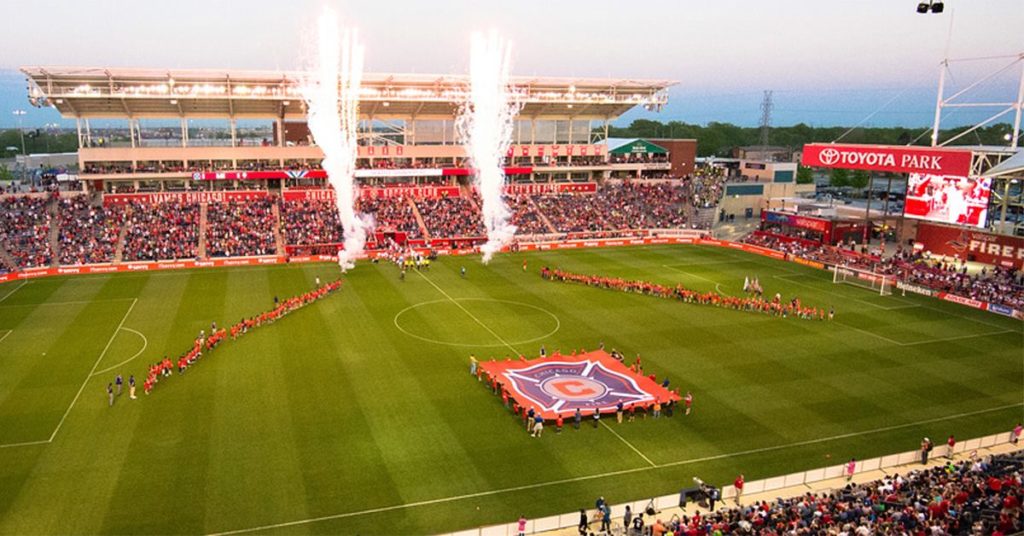
With the details released on the Chicago Fire lease adjustments for SeatGeek Stadium, those seeking clarity on the future venue situation for the team may be a little disappointed, as the status for the 2020 season is still up in the air.
The amended lease has not been approved—that’s expected to happen at the end of the month—but the Fire, MLS and Bridgeview have signed a Memorandum of Understanding outlining the terms. As has been reported earlier, the agreement calls for the Fire to pay $65.5 million to walk away from SeatGeek Stadium and a lease originally set to run through 2036.
But it doesn’t close the door on the Fire playing games at SeatGeek Stadium next season, bringing up the possibility that the Fire could play a 2020 schedule split between SeatGeek Stadium and, say, the larger Soldier Field. This would give the Fire some flexibility in scheduling—after all, Soldier Field potentially hosts plenty of other high-profile events besides Chicago Bears NFL games—during a transitional period should a new stadium be in the works. The biggest change: the Fire would not receive priority scheduling at SeatGeek Stadium, but be treated like any other tenant.
And, interestingly, it also contains some poison pills to protect Bridgeview should the Fire build a new stadium closer to downtown Chicago, as has been rumored. The Fire can build a new stadium wherever they want, but if they want to hold non-MLS events, such as concerts, within 35 miles of SeatGeek Stadium, they’ll need to pay up. Soldier Field is only 15 miles from SeatGeek Stadium, and if the Fire pursues a new stadium somewhere along Lakeshore Drive (as was discussed here), they will pay penalties to Bridgeview if the team hosts concerts or any other events. Those penalties are set up on a sliding scale, starting at $25 million in 2019 and then decreasing annually.
It also gives Bridgeview some time to think about what it wants out of SeatGeek Stadium, a topic that’s not really being discussed in public. With a lease buyout that also includes the Fire funds as well as an agreement by the team to cover the potential loss of naming-rights revenues should SeatGeek cancel, Bridgeview has a relatively free hand to look at potential venue overhauls. Should soccer be a featured offering, perhaps with a venue rightsizing focused more on the NWSL’s Chicago Red Stars? Or should the focus be on musical events? There are plenty of larger outdoor venues hosting concerts—Wrigley Field and Soldier Field, chiefly—but there may be a sweet spot for the more niche events drawing 15,000 instead of the 35,000 at Wrigley Field or the 50,000 at Soldier Field. (Speaking of concerts at Wrigley Field and Soldier Field: the Cubs scheduled only one major musical event there in 2019—Dead & Company over two nights in June. And Live Nation booked no major concerts at Soldier Field this summer.) It’s not as through the Cubs’ concert partner, Live Nation, didn’t have access to big names on tour, but the trend seems to be bookings in smaller amphitheaters. In Chicago, the likes of Brad Paisley and Florida Georgia Line are playing the Hollywood Casino Amphitheatre, not the larger venues.
So, if you were looking for some clarity upon learning the specifics of the amended lease: sorry to disappoint. The situation for both the Fire and Bridgeview is still very much a work in progress.
Image courtesy Chicago Fire.
RELATED STORIES: Chicago Fire Amend SeatGeek Stadium Lease, Paving Way for Exit; Chicago Fire to Pay $60.5M to Break SeatGeek Stadium Lease; Michael Reese Hospital Site Could be in Play for New Chicago Fire Stadium; Report: Chicago Fire Negotiating SeatGeek Stadium Exit, Soldier Field Return
